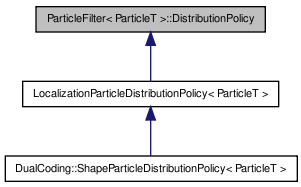ParticleFilter< ParticleT >::DistributionPolicy Class Reference
A distribution policy provides the ability to randomize ("redistribute") or tweak the values of a group of particles. More...
#include <ParticleFilter.h>

Detailed Description
template<typename ParticleT>
class ParticleFilter< ParticleT >::DistributionPolicy
A distribution policy provides the ability to randomize ("redistribute") or tweak the values of a group of particles.
Unlike the other particle filter helper classes, the functions for the distribution policy operate on a subset of the particles at a time. You may wonder why the randomize() and jiggle() functions aren't simply made methods of the ParticleBase class. The main reason is that these functions may need additional parameters, such as specification of how large an area to distribute over, and these parameters are static across particles. However, if they were actually static members of the particle class, then the values would be shared by all particle filters. By making a separate class to hold the parameters and apply the one-to-many relationship, you can have multiple particle filters with the same type of particle, and each filter can have different parameter values controlling distribution of its particles.
Note that the DistributionPolicy is actually a property of the resampling policy, not directly of the particle filter itself.
Definition at line 182 of file ParticleFilter.h.
Public Types | |
| typedef ParticleT | particle_type |
| redefinition here allows reference to the particle type even if the template parameter may be abstracted away due to a typedef | |
| typedef std::vector < particle_type > | particle_collection |
| the collection type we'll be using to store the particles | |
| typedef particle_collection::size_type | index_t |
| index type for refering to particles within the collection | |
Public Member Functions | |
| virtual | ~DistributionPolicy () |
| destructor | |
| virtual void | randomize (particle_type *begin, index_t num)=0 |
| This should redistribute the particles over a large area, independently of the particle's current value. | |
| virtual void | jiggle (float var, particle_type *begin, index_t num)=0 |
| This should slightly modify the particles' state values. | |
Member Typedef Documentation
| typedef particle_collection::size_type ParticleFilter< ParticleT >::DistributionPolicy::index_t |
index type for refering to particles within the collection
Reimplemented in LocalizationParticleDistributionPolicy< ParticleT >, and DualCoding::ShapeParticleDistributionPolicy< ParticleT >.
Definition at line 186 of file ParticleFilter.h.
| typedef std::vector<particle_type> ParticleFilter< ParticleT >::DistributionPolicy::particle_collection |
the collection type we'll be using to store the particles
Definition at line 185 of file ParticleFilter.h.
| typedef ParticleT ParticleFilter< ParticleT >::DistributionPolicy::particle_type |
redefinition here allows reference to the particle type even if the template parameter may be abstracted away due to a typedef
Reimplemented in LocalizationParticleDistributionPolicy< ParticleT >, and DualCoding::ShapeParticleDistributionPolicy< ParticleT >.
Definition at line 184 of file ParticleFilter.h.
Constructor & Destructor Documentation
| virtual ParticleFilter< ParticleT >::DistributionPolicy::~DistributionPolicy | ( | ) | [virtual] |
destructor
Definition at line 187 of file ParticleFilter.h.
Member Function Documentation
| virtual void ParticleFilter< ParticleT >::DistributionPolicy::jiggle | ( | float | var, | |
| particle_type * | begin, | |||
| index_t | num | |||
| ) | [pure virtual] |
This should slightly modify the particles' state values.
- Parameters:
-
var indicates the scale of the variance desired -- multiply whatever variance you use for modifying each state parameter by this value begin the first particle in the array num the number of particles to apply the operation to
This function is called on particles which have been replicated from an existing particle to explore the space around that particle. The more accurate your sensors and particle evaluation, the smaller the jiggle variance can be.
Referenced by ParticleFilter< ParticleT >::LowVarianceResamplingPolicy::resample(), and ParticleFilter< LocalizationParticle >::setPosition().
| virtual void ParticleFilter< ParticleT >::DistributionPolicy::randomize | ( | particle_type * | begin, | |
| index_t | num | |||
| ) | [pure virtual] |
This should redistribute the particles over a large area, independently of the particle's current value.
Randomization occurs whenever the particle filter doesn't have any usable particles for replication, either because the particle filter has just been created and doesn't have any information yet, or because new sensor readings have invalidated all of the current particles.
Referenced by ParticleFilter< ParticleT >::LowVarianceResamplingPolicy::resample(), ParticleFilter< LocalizationParticle >::resetFilter(), and ParticleFilter< LocalizationParticle >::resizeParticles().
The documentation for this class was generated from the following file: